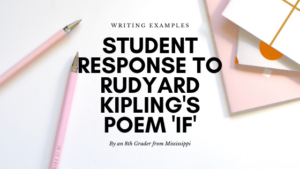Writing Task
You have read the short story “The Landlady” written by Roald Dahl about a young, aspiring businessman discovering a bed and breakfast with a mysterious landlady. Write an essay explaining the word “dotty” from page 174 and how it impacts the plot of the story. Be sure to use specific evidence to support your response.
Student Response
“‘Left?’ she said, arching her brow. ‘But my dear boy, he never left.’” Throughout the story, the main character struggles with the lady’s politeness versus her awkwardness. In the short story “The Landlady”, the word “dotty” impacts the plot of the story.
The crazy lady in the story alters the way the story would normally be expected to go. On page 179 the text says, “I stuff all my little pets myself when they pass away.” It is weird enough that a lady stuffs her dead animals, but the fact of knowing that it is foreshadowing his death makes it even crazier. She is for sure “dotty.” This word helps set the tone of crazy and horrifying. On page 178 the author also states, “‘There wasn’t a blemish on his body.’ ‘A what?’ Billy said. ‘His skin was just like a baby’s.’” This is further proof that the landlady is crazy. First, she was talking about not having any blemishes on his whole body. It is weird enough to reference his entire body, but then she proceeds to say his skin felt like a baby’s. Her actions are super dotty which leads the reader to feel suspicious. Based on the evidence, the landlady is dotty and she affects the whole sequence of events.
In conclusion, the word “dotty” impacts the plot of “The Landlady.” Imagine if you were visiting a town for business and this landlady’s bed and breakfast was the only place to stay. What would you do? How would you handle the situation?
Writing Details
“The Landlady” is usually one of the stories I use early in the school calendar; therefore, this essay might be a bit shorter than some of the other student works but is still a high-quality analysis by an 8th Grader from a PorterHasClass 2017 student. Follow me on Twitter for other student examples, articles of the week, or blog posts.



